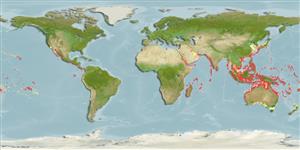Common names from other countries
Classification / Names / Names
Common names | Synonyms | Catalog of Fishes (gen., sp.) | ITIS | CoL | WoRMS
Environment: milieu / climate zone / depth range / distribution range
Ecology
Benthic; depth range 0 - 50 m (Ref. 349). Tropical
Indo-Pacific.
Length at first maturity / Size / Weight / Age
Maturity: Lm ? range ? - ? cm Max length : 33.0 cm SHL male/unsexed; (Ref. 349); common length : 20.0 cm SHL male/unsexed; (Ref. 349)
This large and common species is actively collected in many parts of the Indo-West Pacific realm (Ref. 349). Maximum depth from Ref. 101003. Often on clean coarse sand and rubble bottoms in which large individuals partially bury themselves. Preys on bivalves and other gastropods (Ref. 349). Damages pearl oyster beds (Ref. 799).
Life cycle and mating behavior
Maturity | Reproduction | Spawning | Eggs | Fecundity | Larvae
This species is a non-broadcast spawner. Life cycle does not include trocophore stage. Also Ref. 833.
Poutiers, J.M. 1998. (Ref. 349)
IUCN Red List Status (Ref. 130435)
CITES status (Ref. 108899)
Not Evaluated
Not Evaluated
Threat to humans
Harmless
Human uses
| FishSource |
Tools
Internet sources
Estimates based on models
Preferred temperature
(Ref.
115969): 22.8 - 29.1, mean 28 (based on 1524 cells).
Vulnerability
Low vulnerability (23 of 100).
Price category
Unknown.
